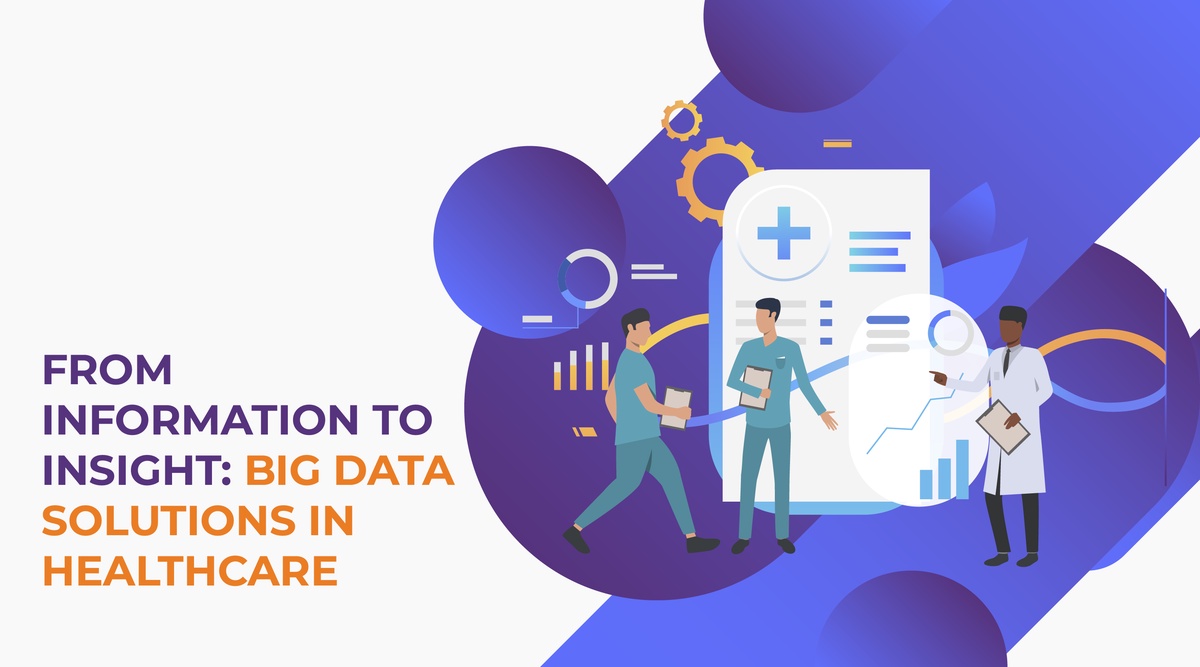Healthcare organizations are turning to Big Data analytics as they search for ways to boost operational effectiveness and patient outcomes. Big Data Analytics can shed light on patient conditions, treatment efficacy, and population health trends. It gathers and analyzes enormous amounts of data from numerous sources, including electronic health records, medical imaging, and wearable technology.
Even the largest hospitals and healthcare organizations are beginning to recognize the value of Big Data in healthcare. Healthcare organizations are partnering to use data science to discover ailments earlier and promote faster pathways to improved patient health.
Big Data Solutions: The Transformative Element Behind Healthcare Services
Big Data has established itself as a helpful resource by being felt in many industries, especially healthcare. Recently, there has been an increase in the desire for effective and efficient patient care, which has prompted the integration of technology and medical care, such as robot-assisted operations and AR/VR for complex body evaluations.
As a result, Big Data, comprising patient records, test results, and hospital data, is revolutionizing the healthcare industry. According to market research, during 2022–2030, the Big Data in the Healthcare market is anticipated to expand at a CAGR of 18.2% and reach a market value of USD 81.3 billion.
Benefits of Big Data That Revolutionizes The Healthcare Sector
Here are several ways that using Big Data in healthcare might help hospitals manage these data to provide better patient care.
Enhances Patient Healthcare:
Numerous healthcare providers can now develop their clinical expertise due to the interaction between Big Data and the knowledge it generates. Healthcare data sets serve to enhance patient care.
Everything is explained by the fact that doctors can prescribe appropriate therapy, make more precise clinical decisions, and remove any uncertainty with the help of healthcare databases. Big Data in healthcare is helping the sector get closer to better patient outcomes since it can be used to identify the best approaches for individual patients.
Predicts Patients at Higher Risk:
Aggregate data in healthcare makes it simple to pinpoint the patient population in a given area or city that is more susceptible to certain diseases. It also offers advice on how to protect patients during early intervention. The description of some chronic diseases is also highly effective when using this type of prediction.
Quick and Easy Patient Diagnostics with EHRs:
One of the most popular uses for data sets in healthcare is this. Efficient patient diagnosis is simple when patients can access their Electronic Health Records (EHRs). This information covers the patient's medical background, allergies, the course of therapy for initial conditions, diagnostic information, and many other specifics. Doctors can easily access patient files and update them with new details regarding a patient's ailment or treatment plan. Additionally, you can use this system to inform individuals of a doctor's visit.
Ensures to Mitigate Overall Healthcare Costs:
Healthcare professionals using aggregate data can spot trends that help them better understand their patient's bodies and health. Because money won't be wasted on pointless services or hospitalization, it will result in cost reductions and resource optimization.
These data can also show clinicians how to manage patients better and more successfully, potentially leading to fewer hospitalizations or readmissions. This lowers the cost of medical care for both patients and medical facilities. Additionally, combining Big Data with healthcare solutions makes determining each patient's treatment expenses possible, considerably enhancing healthcare efficiency through meticulous treatment planning.
Delivers Accurate Patient Insights:
Big Data analysis in healthcare can help you better identify which population segments are more likely to contract specific diseases. Additionally, it enables the prompt application of necessary preventive actions. It's interesting to note that such information can empower patients to make decisions about their health. Additionally, merging clinical data into one Big Data set enhances the efficacy of patient treatment programs, leading to better patient outcomes.
Minimizing Medical Errors:
Big Data can significantly lower the rate of medical errors. Data analytics tools can flag dubious entries for human review by a healthcare practitioner by searching for anomalies in data sources like Electronic Health Records (EHRs). As an illustration, Johns Hopkins researchers have created a method for using Big Data to remedy diagnostic mistakes by matching patient symptoms with commonly mistreated diseases.
Increasing Health Indicators:
Big Data solutions have been found to enhance public health metrics in various areas, including mental diseases, suicide mortality rates, and diabetes. According to a study published in the Journal of Medical Internet Research, Big Data analytics has shown helpful use cases like diagnosing illnesses and managing chronic diseases.
Improving Patient Experiences:
Data analytics enables healthcare professionals to make more informed choices regarding improving patient care and the overall patient experience. One of the other benefits of Big Data is patients can get better care, better health outcomes, and more positive relationships with healthcare providers thanks to Big Data analytics.
Personalized Self-Care with Biometrics Monitoring:
As consumers become more aware of the advantages of biometrics monitoring, the adoption of smartwatches and other wearable technology for tracking fitness and health has increased.
These gadgets collect a tonne of information, such as heart rate, blood sugar levels, SPO2, sleep patterns, etc. The most recent and precise Machine Learning techniques are continuously included in detection systems and classifiers, making recognizing and monitoring widespread respiratory and cardiovascular problems simpler.
Regular data tracking can help identify health concerns early, lowering the risk of severe repercussions and allowing healthcare institutions to treat patients before the disease worsens.
Improving Clinical Trials:
Big Data can potentially improve clinical trials in the healthcare sector by identifying appropriate patients for tests, optimizing study design, and enhancing patient monitoring. By analyzing vast amounts of data from electronic health records, medical devices, and patient-reported outcomes, Big Data solutions can help researchers identify potential study participants more efficiently and accurately. By leveraging real-time data, Big Data can also enhance patient monitoring, leading to quicker identification of adverse events and improved safety during clinical trials.
Supply Chain Optimization:
Healthcare organizations can use Big Data analytics to enhance supply chain management by analyzing information on medicine usage, inventory levels, and purchasing trends. By doing this, waste is decreased, cost-effectiveness is increased, and a sufficient supply of necessary medications and medical supplies is guaranteed.
Fraud Detection:
Big Data analytics can assist in detecting healthcare fraud by identifying patterns and anomalies in data that may indicate fraudulent activities. By analyzing large volumes of data from various sources, including claims data and electronic health records, analytics can uncover irregularities and inconsistencies that might otherwise go undetected. This can help prevent fraudulent billing, prescription drug abuse, and other illegal activities, ultimately saving patients and the healthcare industry money.
Conclusion
Big Data is fueling new developments that are revolutionizing the healthcare industry. Big Data platforms and creative healthcare solutions improve patient care, providing more precise medical diagnoses. Big Data in Healthcare can give professionals valuable insights to enhance services, lower costs, and reduce health hazards.
TRooTech provides a full range of Big Data services covering the complete data lifecycle, including data gathering, ingestion, aggregation, storage, processing, visualization, and analytics. These services enable businesses to match their data transformation investments with their desired results. Contact a team member today to speak with an expert.


No comments yet